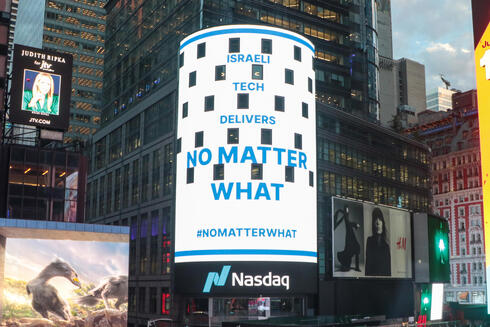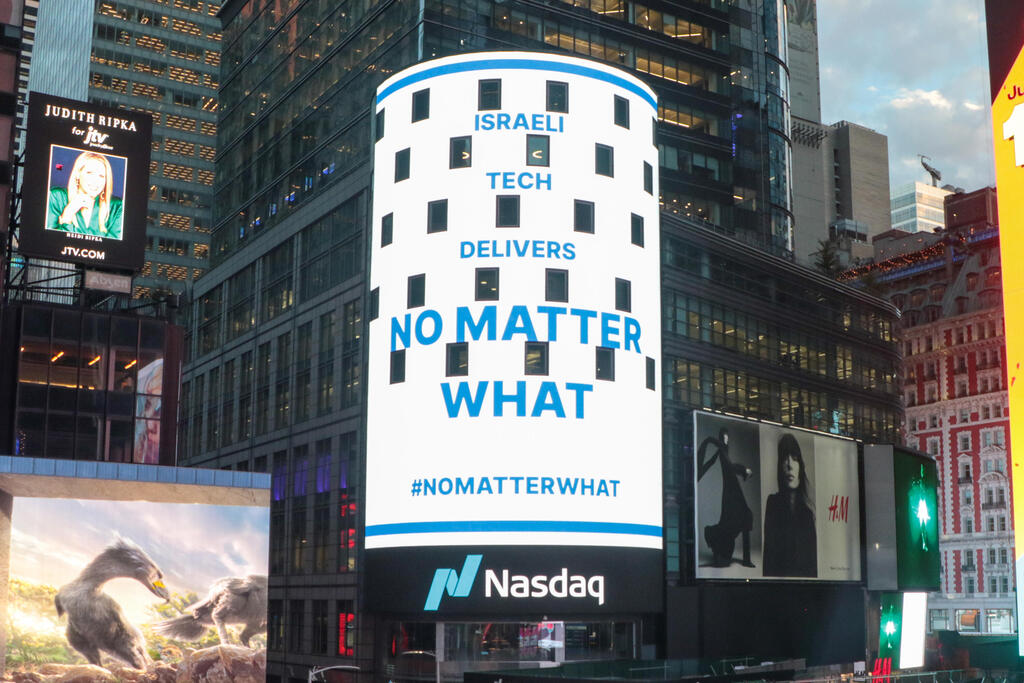
Israeli tech stocks on Wall Street manage to avoid impact from Hamas war
The sweeping decline in tech stocks following the October 7 attack has been halted, with some Israeli companies reporting better performance than before the war began.
While there were significant declines in Israeli tech stocks traded on Wall Street following the October 7 attack and subsequent war with Hamas, this seems to have now stabilized. Investors understand that these are international companies, and in recent weeks, fluctuations in stocks have been more in line with general market trends and their business performances. As a result, and following a monthly increase of 5% in the NASDAQ, many Israeli stocks have already recovered from the decline in the first week of the war.
In recent years Israeli stocks have proved less reactive to isolated military operations, there was concern since the outbreak of the war in Gaza that this time the situation would be different. This concern was mainly due to the withdrawal of foreign funds from Israeli stocks in October, leading to sharp declines, as well as the global prevalence of antisemitic sentiment, surprisingly even in the relatively liberal high-tech sector.
In conference calls, almost no questions are raised regarding the war's impact on company performance, and if any, it is initiated by the management themselves, providing updates on the impact of reserve mobilization on the number of employees and the functioning of various departments within the organizations. At this stage, most companies are transferring some responsibilities to employees in other locations, and as long as the employees in reserves return quickly, a dramatic impact on the companies' situation is not expected. The main concern still hovering over all companies is if their reserve service is extended, which may affect the development and launch of new products and services.
Many companies are showing signs of recovery, such as cyber company Check Point, which reached an annual peak last week and approaching its all-time high from early 2022. Taboola's stock shows an annual return of almost 100%, even though it is much younger on Wall Street compared to Check Point, which has experienced intifadas and wars. Unlike Check Point CEO Gil Shwed, Taboola CEO Adam Singolda does not hesitate to express unequivocal support for Israel online. He was also among the leading voices calling for the boycott of the Web Summit following remarks made by CEO Paddy Cosgrave. Taboola, which published quarterly reports last week, surpassed expectations and raised its forecast for the fourth quarter. Taboola employs 2,000 workers, several hundred in Israel, though 98% of its revenue is reported to be generated outside Israel.
Related articles:
- Gil Shwed: Cyber attacks on Israeli companies demanding ransom doubled during war
- Tal Jacobson, Perion’s CEO: "Israeli companies’ phenomenal performance at this time is more important than ever for the public perception of our economic resilience"
- Following halt due to war, Israeli high-tech companies resume recruitment
Insurtech company Lemonade's stock has achieved an annual return of 47%, its stock actually jumped 40% immediately after publishing strong financial reports, and is 22% higher than its value on the eve of the war. Wix is reporting good results, raising the annual forecast after a drop in value in October. Now it is traded at a similar value to its pre-war value and shows a modest annual return of 5%. The company made headlines after firing an employee at its Irish branch due to anti-Israel statements, a controversy that reached Irish President Michael Higgins. Cyber company CyberArk is today trading at a 10% higher price than on October 6 after publishing good financial reports. A third of the company’s 3,000 employees are in Israel, though it does not expect a significant impact on its operations, and CyberArk Founder and Chairman Udi Mokady hung a large Israeli flag at the entrance to its headquarters in Boston.
Ironically, the current financial reporting season seems to be one of the best that companies have experienced in a long time. In Israel, this has been lost amidst the noise of war, but in the U.S., it has reinforced positive sentiment towards Israel’s tech sector. Although the war did not affect third-quarter results, the positive surprise comes from the fact that many companies that have already released results have raised their forecast for the fourth quarter.
After a year and a half of revenue cuts on the one hand and high interest rates on the other, most companies report reaching profitability ahead of schedule. The main disappointments at this stage are SolarEdge and Playtika, which have been dealing with challenges since before the war, as well as Amdocs, which reported mediocre results. The financial reporting season will continue in the coming week, as will the war, and simultaneously, the tough battles over Israel's reputation. In fact, investors say privately that precisely now, as it appears that the government’s judicial reform has been momentarily set aside, they want to invest in Israeli tech at a higher level than three months ago.














